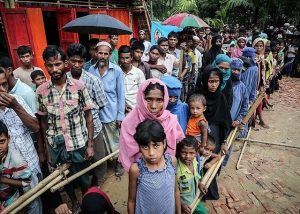
Source: Wikimedia Commons
Rohingyas are a small ethnic minority in Myanmar who have been subject to persecution by the Myanmar government and military. In 2017, the Myanmar army cracked down on Rohingya Muslims and this led to the Rohingyas fleeing into India. In August 2017, the Indian government released a circular that required all the States and Union Territories to identify and deport illegal immigrants. It claimed that that the ‘infiltration’ from Myanmar was a burden on India’s infrastructure and would undermine its national security.
The Rohingyas filed a petition in the Supreme Court in 2017 claiming that their deportation violated constitutional protections under Articles 14, 21, and 51 (c). On 7 March 2021, the Petitioners filed an interim application to release detainees who were being placed in holding centers in Jammu and Kashmir. The petitioners feared that the detainees would be deported back to Myanmar.
The Court pronounced its order on this application on 8 April 2021. The order did not grant interim relief to the petitioners and instead permitted the deportation of Rohingyas as long as prescribed procedures were followed. This order has been heavily criticised by lawyers and academics. The judgement highlights the Court’s refusal to engage with principles of natural justice and existing jurisprudence on this subject. It fails to recognize that ‘non-refoulment’ must be followed by India even though India has not ratified the 1951 Refugee Convention because ‘non-refoulment has achieved the status of jus cogens under Customary International Law. Second, the Court failed to consider legal precedents which state that international law can be accommodated into domestic law without legislative sanction. The Court also forgot that there is no domestic law that requires the Government to disobey the principle of ‘non-refoulment.’
The last but most important flaw is that neither does the Court nor does the Government of India acknowledge that the Rohingyas are in fact stateless. Although they were issued national verification cards, they are not listed as a ‘national race’ under Myanmar’s Citizenship Act, thereby rendering them stateless. They are classified as “resident foreigners” or as “associate citizens” unless they prove that their ancestors have lived in the country prior to 1823.
The Convention Relating to the Status of Stateless Persons adopted by the United Nations General Assembly in 1954, defines a ‘stateless person’ as anyone ‘who is not considered as a national by any State under the operation of its law’. As Mira L. Siegelberg states, this is a narrow definition of ‘statelessness’ and even so, it applies to the Rohingya Refugees.
Seigelberg argues that ‘For the poor and disenfranchised, membership in a state is as important as ever.’ Without any nationality, statelessness affects socio-economic rights such as education, employment, housing, healthcare, and civil and political rights such as freedom of movement and political participation pushing them to the margins. In Malaysia for instance, the Rohingya are detained in immigration camps where they are beaten, made to live in unsanitary conditions, and suffer malnutrition. They lack legal protection or even humane conditions of living.
As is the case with Rohingyas, being displaced, particularly over multiple generations, increases vulnerability to statelessness. Their statelessness is a direct consequence of systemic discrimination, persecution, and exclusion by law, policy, and practice. The lack of a legal framework on statelessness and the fact that India has refrained from signing the 1951 Refugee Convention, 1954 Convention relating to the Status of Stateless Persons, or the 1961 Convention on the Reduction of Statelessness indicates that the Indian Government does not acknowledge the devastating conditions of a ‘stateless’ person and continues to refrain from giving them aid. This state of affairs must change and India must do everything in its capacity to assist stateless communities and treat them as bearers of rights.

